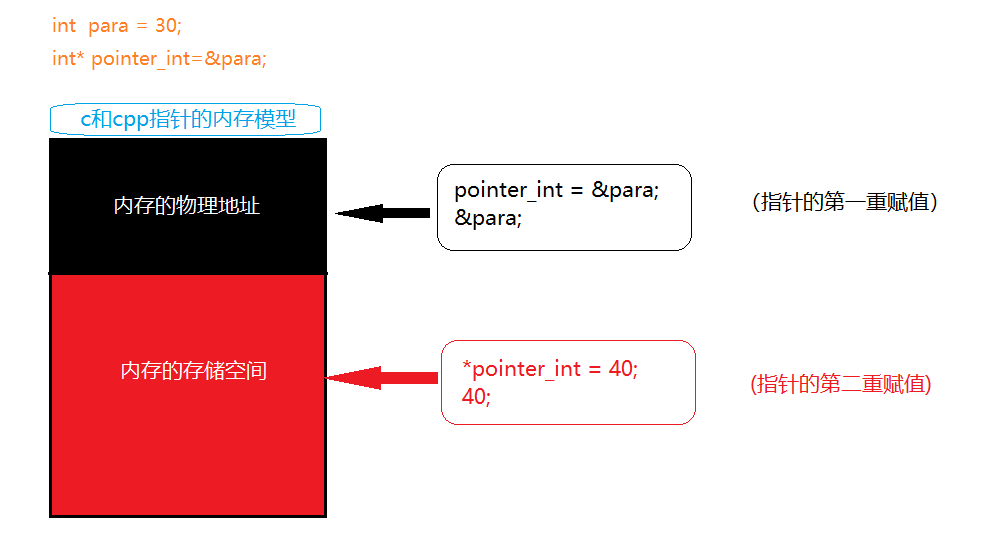cpp: 指针和引用(class & object)
一、指针使用、引用的运用
1、指针具有双重赋值的属性:第一重赋值,为指针变量赋值内存地址;第二重赋值,为指针变量所指的内存的存储空间赋予内容。

2、(引用:cpp的特性;“引用”作为函数的参数):"引用"仍然是值传递。和普通变量相比较,“引用”只是不产生变量的临时副本。
1 [root@rockylinux tmp]# uname -a
2 Linux rockylinux 4.18.0-372.19.1.el8_6.x86_64 #1 SMP Tue Aug 2 16:19:42 UTC 2022 x86_64 x86_64 x86_64 GNU/Linux
3 [root@rockylinux tmp]#
4 [root@rockylinux tmp]#
5 [root@rockylinux tmp]# g++ --version
6 g++ (GCC) 8.5.0 20210514 (Red Hat 8.5.0-10)
7 Copyright (C) 2018 Free Software Foundation, Inc.
8 This is free software; see the source for copying conditions. There is NO
9 warranty; not even for MERCHANTABILITY or FITNESS FOR A PARTICULAR PURPOSE.
10
11 [root@rockylinux tmp]#
12 [root@rockylinux tmp]#
13 [root@rockylinux tmp]# cat reference.cpp
14 #include<iostream>
15
16
17 using namespace std;
18
19
20 int* return_value1(int& para)
21 {
22 int* tmp = ¶ // 可以获取para的地址;
23 return tmp;
24 }
25
26
27 int* return_value2(int& para)
28 {
29 return ¶ // 可以返回para的地址;
30 }
31
32
33 int* return_value3(int& para)
34 {
35 return para; // 如果这里报错,就说明“‘引用’是值传递”;
36 }
37
38
39 int main(int argc, char* argv[], char* envp[])
40
41 int main(int argc, char* argv[], char* envp[])
42 {
43
44 int ref = 1949;
45
46
47 int* pt1 = nullptr;
48 int* pt2 = nullptr;
49 int* pt3 = nullptr;
50
51
52 pt1 = return_value1(ref);
53 cout << "pt1 = " << *pt1 << endl;
54 pt2 = return_value2(ref);
55 cout << "pt2 = " << *pt2 << endl;
56 pt3 = return_value3(ref);
57 cout << "pt3 = " << *pt3 << endl;
58
59
60 return 0;
61
62
63 }
64 [root@rockylinux tmp]#
65 [root@rockylinux tmp]#
66 [root@rockylinux tmp]# g++ -o reference reference.cpp
67 reference.cpp: In function ‘int* return_value3(int&)’:
68 reference.cpp:22:9: error: invalid conversion from ‘int’ to ‘int*’ [-fpermissive]
69 return para; // 如果这里报错,就说明“‘引用’是值传递”;
70 ^~~~
71 reference.cpp: At global scope:
72 reference.cpp:28:1: error: expected initializer before ‘int’
73 int main(int argc, char* argv[], char* envp[])
74 ^~~
75 [root@rockylinux tmp]#
76 [root@rockylinux tmp]#
二、代码和运行结果
1 [root@rockylinux tmp]# uname -a
2 Linux rockylinux 4.18.0-372.19.1.el8_6.x86_64 #1 SMP Tue Aug 2 16:19:42 UTC 2022 x86_64 x86_64 x86_64 GNU/Linux
3 [root@rockylinux tmp]#
4 [root@rockylinux tmp]#
5 [root@rockylinux tmp]# g++ --version
6 g++ (GCC) 8.5.0 20210514 (Red Hat 8.5.0-10)
7 Copyright (C) 2018 Free Software Foundation, Inc.
8 This is free software; see the source for copying conditions. There is NO
9 warranty; not even for MERCHANTABILITY or FITNESS FOR A PARTICULAR PURPOSE.
10
11 [root@rockylinux tmp]#
12 [root@rockylinux tmp]#
13 [root@rockylinux tmp]# cat mix_data_structure.cpp
14 #include<iostream>
15 #include<string>
16
17
18 using namespace std;
19
20
21 template<typename N, typename I>
22 struct persion{
23 string uid;
24 N uname;
25 I uinformation;
26 };
27
28
29 class msg
30 {
31 public:
32 msg()
33 {
34 uid = new string;
35 uname = new string;
36 uinformation = new string;
37 }
38 msg(string* id, string* name, string* info)
39 {
40 uid = new string;
41 uname = new string;
42 uinformation = new string;
43
44 *uid=*id;
45 *uname=*name;
46 *uinformation=*info;
47 }
48 msg(const msg* message)
49 {
50 uid = new string;
51 uname = new string;
52 uinformation = new string;
53
54 *uid = *message->uid;
55 *uname = *message->uname;
56 *uinformation = *message->uinformation;
57 }
58 ~msg(){ delete uid; delete uname; delete uinformation;}
59
60
61 void set_uid(string* id)
62 {
63 *uid=*id;
64 }
65
66 string* get_uid()
67 {
68 return uid;
69 }
70
71
72 void set_uname(string* name)
73 {
74 *uname=*name;
75 }
76
77 string* get_uname()
78 {
79 return uname;
80 }
81
82 void set_uinformation(string* info)
83 {
84 *uinformation=*info;
85 }
86
87 string* get_uinformation()
88 {
89 return uinformation;
90 }
91 private:
92 string* uid;
93 string* uname;
94 string* uinformation;
95 };
96
97
98 template<class N, class I>
99 class student
100 {
101 public:
102 student(){ stud.uid="usr_null"; stud.uname="usr_null"; stud.uinformation="usr_null";}
103 student(string* id, N* name, I* info){ stud.uid=*id; stud.uname=*name; stud.uinformation=*info;}
104 student(const student& st){ stud.uid=st.uid; stud.uname=st.uname; stud.uinformation=st.uinformation;}
105 void set_all(string id, N name, I info){ stud.uid=id; stud.uname=name, stud.uinformation=info;}
106 string get_uid(){ return stud.uid;}
107 N get_uname(){ return stud.uname;}
108 I get_uinformation(){ return stud.uinformation;}
109 void print_result()
110 {
111 cout << "OS_STUDENT:";
112 cout << "\tid=" << stud.uid;
113 cout << ",\tname=" << stud.uname;
114 cout << ",\tinformation=" << stud.uinformation << endl;
115 }
116 private:
117 persion<N,I> stud;
118 };
119
120
121 class teacher
122 {
123 public:
124 teacher(){ message = new msg;}
125 teacher(string* id, string* name, string* info)
126 {
127 message= new msg;
128 message->set_uid(id);
129 message->set_uname(name);
130 message->set_uinformation(info);
131 }
132 teacher(const teacher& t)
133 {
134 message = new msg;
135 message ->set_uid(t.message->get_uid());
136 message ->set_uname(t.message->get_uname());
137 message ->set_uinformation(t.message->get_uinformation());
138 }
139 ~teacher(){delete message;}
140 void print_result()
141 {
142 cout <<"OS_TEACHER:";
143 cout <<"\tid=" << *message->get_uid();
144 cout <<",\tname="<< *message->get_uname();
145 cout <<",\tinformation="<< *message->get_uinformation()<< endl;
146 }
147 private:
148 msg* message;
149 };
150
151
152
153 int main(int argc, char* argv[], char* envp[])
154 {
155
156 string id = "20220830";
157 string name = "tiger";
158 string info = "forest_universe";
159
160 string* pointer_id = &id;
161 string* pointer_name = &name;
162 string* pointer_info = &info;
163
164
165 student<string, string> st(pointer_id, pointer_name, pointer_info);
166 st.print_result();
167
168
169 teacher tr(pointer_id, pointer_name, pointer_info);
170 tr.print_result();
171
172
173 return 0;
174
175
176 }
177 [root@rockylinux tmp]#
178 [root@rockylinux tmp]#
179 [root@rockylinux tmp]# g++ -o mix_data_structure mix_data_structure.cpp
180 [root@rockylinux tmp]#
181 [root@rockylinux tmp]#
182 [root@rockylinux tmp]# ./mix_data_structure
183 OS_STUDENT: id=20220830, name=tiger, information=forest_universe
184 OS_TEACHER: id=20220830, name=tiger, information=forest_universe
185 [root@rockylinux tmp]#
186 [root@rockylinux tmp]#